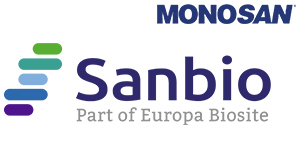Mouse anti-Tumor Necrosis Factor Receptor, clone H398 (Monoclonal)
Mouse anti-Tumor Necrosis Factor Receptor, clone H398 (Monoclonal)
SKU
SANMON9058
Packaging Unit
1 ml
Manufacturer
Sanbio / Monosan
Availability:
loading...
Price is loading...
Clone Number: H398
Immunogen: Unknown or proprietery to MONOSAN and/or its suppliers
Concentration: 100 ug/ ml
Storage buffer: PBS with 0.1% BSA and 0.02% sodium azide
Additional info: The monoclonal antibody H398 recognizes the extracellular part of the Tumor Necrosis Factor Receptor type I (TNF-RI) of the membrane-bound as well as the soluble receptor. TNF-RI (~55-60 kDa) is present on most cell types and is considered to play a prominent role in cell stimulation by TNF-alpha. TNF-alpha activates inflammatory responses, induces apoptosis, regulates cellular proliferation, and may even promote cancer progression. The effects of TNF-alpha are mediated by TNF-RI and TNF-RII, which have both distinct and overlapping downstream signaling cascades. Induction of cytotoxicity and other functions are mediated largely via TNF-RI. TNF-RI is equally well activated by both the 17 kDa soluble and 26 kDa membrane-bound form, whereas TNF-RII is efficiently activated only by the membrane bound form of TNF-alpha. TNF-RI signaling is initiated when trimeric TNF-alpha binds TNF-RI receptors. Subsequent TNF-RI trimerization promotes the recruitment of a proximal signaling complex composed of TNF Receptor Associated protein with a Death Domain (TRADD), Receptor Interacting Protein (RIP), cellular Inhibitor of Apoptosis Protein 1 (cIAP1), TNF Receptor Associated Factor 2 (TRAF2), and likely TRAF5. Studies with TNF-RI-deficient mice indicate that TNF-RI mediates most of the proliferation, pro-inflammatory, and apoptosis-activating pathways.
References: Thoma; B et al. J Exp Med 1990; 172: 1019 /Grell, M et al Lymphokine Cytokine Res 1993, 12: 143 /Scheurich; P et al. Tumor Necrosis factor 1993; 4: 52
Immunogen: Unknown or proprietery to MONOSAN and/or its suppliers
Concentration: 100 ug/ ml
Storage buffer: PBS with 0.1% BSA and 0.02% sodium azide
Additional info: The monoclonal antibody H398 recognizes the extracellular part of the Tumor Necrosis Factor Receptor type I (TNF-RI) of the membrane-bound as well as the soluble receptor. TNF-RI (~55-60 kDa) is present on most cell types and is considered to play a prominent role in cell stimulation by TNF-alpha. TNF-alpha activates inflammatory responses, induces apoptosis, regulates cellular proliferation, and may even promote cancer progression. The effects of TNF-alpha are mediated by TNF-RI and TNF-RII, which have both distinct and overlapping downstream signaling cascades. Induction of cytotoxicity and other functions are mediated largely via TNF-RI. TNF-RI is equally well activated by both the 17 kDa soluble and 26 kDa membrane-bound form, whereas TNF-RII is efficiently activated only by the membrane bound form of TNF-alpha. TNF-RI signaling is initiated when trimeric TNF-alpha binds TNF-RI receptors. Subsequent TNF-RI trimerization promotes the recruitment of a proximal signaling complex composed of TNF Receptor Associated protein with a Death Domain (TRADD), Receptor Interacting Protein (RIP), cellular Inhibitor of Apoptosis Protein 1 (cIAP1), TNF Receptor Associated Factor 2 (TRAF2), and likely TRAF5. Studies with TNF-RI-deficient mice indicate that TNF-RI mediates most of the proliferation, pro-inflammatory, and apoptosis-activating pathways.
References: Thoma; B et al. J Exp Med 1990; 172: 1019 /Grell, M et al Lymphokine Cytokine Res 1993, 12: 143 /Scheurich; P et al. Tumor Necrosis factor 1993; 4: 52
| SKU | SANMON9058 |
|---|---|
| Manufacturer | Sanbio / Monosan |
| Manufacturer SKU | MON9058 |
| Package Unit | 1 ml |
| Quantity Unit | STK |
| Reactivity | Human, Rat (Rattus) |
| Clonality | Monoclonal |
| Application | Immunohistochemistry (frozen), Immunoprecipitation, Western Blotting, ELISA, Flow Cytometry, Functional Assay |
| Isotype | IgG2a |
| Host | Mouse |
| Conjugate | Unconjugated |
| Product information (PDF) | Download |
| MSDS (PDF) |
|

 Deutsch
Deutsch







